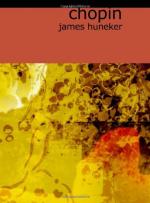Chopin got a passport vised for London, “passant par Paris &. Londres,” and had permission from the Russian Ambassador to go as far as Munich. Then the cholera gave him some bother, as he had to secure a clean bill of health, but he finally got away. The romantic story of “I am only passing through Paris,” which he is reported to have said in after years, has been ruthlessly shorn of its sentiment. At Munich he played his second concerto and pleased greatly. But he did not remain in the Bavarian capital, hastening to Stuttgart, where he heard of the capture of Warsaw by the Russians, September 8, 1831. This news, it is said, was the genesis of the great C minor etude in opus 10, sometimes called the “Revolutionary.” Chopin exclaimed in a letter dated December 16, 1831, “All this caused me much pain—who could have foreseen it!” and in another letter he wrote, “How glad my mamma will be that I did not go back.” Count Tarnowski in his recollections prints some extracts from a diary said to have been kept by Chopin. According to this his agitation must have been terrible. Here are several examples:
“My poor father! My dearest ones! Perhaps they hunger? Maybe he has not anything to buy bread for mother? Perhaps my sisters have fallen victims to the fury of the Muscovite soldiers? Oh, father, is this the consolation of your old age? Mother, poor suffering mother, is it for this you outlived your daughter?”
“And I here unoccupied! And I am here with empty hands! Sometimes I groan, suffer and despair at the piano! O God, move the earth, that it may swallow the humanity of this century! May the most cruel fortune fall upon the French, that they did not come to our aid.” All this sounds a trifle melodramatic and quite unlike Chopin.
He did not go to Warsaw, but started for France at the end of September, arriving early in October, 1831. Poland’s downfall had aroused him from his apathy, even if it sent him further from her. This journey, as Liszt declares, “settled his fate.” Chopin was twenty-two years old when he reached Paris.
II. PARIS:—IN THE MAELSTROM
Here, according to Niecks, is the itinerary of Chopin’s life for the next eighteen years: In Paris, 27 Boulevard Poisonniere, to 5 and 38 Chaussee d’Antin, to Aix-la-Chapelle, Carlsbad, Leipzig, Heidelberg, Marienbad, and London, to Majorca, to 5 Rue Tronchet, 16 Rue Pigalle, and 9 Square d’Orleans, to England and Scotland, to 9 Square d’Orleans once more, Rue Chaillot and 12 Place Vendeme, and then—Pere la Chaise, the last resting-place. It may be seen that Chopin was a restless, though not roving nature. In later years his inability to remain settled in one place bore a pathological impress,—consumptives are often so.




